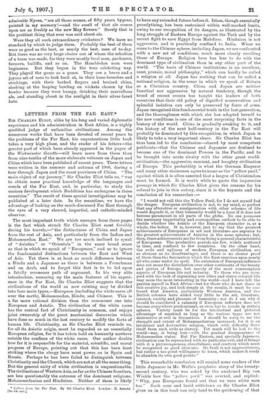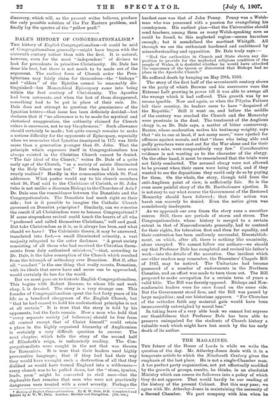LETTERS FROM THE FAR EAST.*
SIR CHARLES ErJor, alike by his long and varied diplomatic experience and his administration in East Africa, is a highly qualified judge of unfamiliar civilisations. Among the numerous works that have been devoted of recent years to the problems of the Far East, his unpretentious little book takes a very high place, and the reader of his letters—the greater part of which have already appeared in the pages of the Westminster Gazette—will learn more from them than from nine-tenths of the more elaborate volumes on Japan and China which have been published of recent years. These letters were written in the summer and autumn of 1906, during a tour through Japan and the coast provinces of China. "The main object of my journey," Sir Charles Eliot tells us, "was to obtain some practical knowledge of the languages and creeds of the Far East, and, in particular, to study the curious development which Buddhism has undergone in those countries." The result of these special investigations may be published at a later date. In the meantime, we have the advantage of looking on the much-discussed Far East through the eyes of a very shrewd, impartial, and catholic-minded observer.
The most important truth which emerges from these pages is the fact which struck Sir Charles Eliot most forcibly during his travels,—" the distinctness of China and Japan from the rest of Asia, and particularly from the Indian and Mohammedan East." We are too much inclined to speak of " Asiatics " or " Orientals " in the same broad sense as that in which we speak of "Europeans," and so to ignore the fundamental distinctions between the East and West of Asia. Yet there is at least as much difference between a Hindu and a Japanese as there is between a Frenchman and an Arab, and to forget this fact is to be led upon a fatally erroneous path of argument. In his very able introduction, summing up the main features of his experi- ence in the Far East, Sir Charles Eliot suggests that the civilisations of the world as now existing may be divided into four main types,—European (including the white races all over the earth), Mohammedan, Hindu, and Chinese. This is a far more rational division than the commoner one into European and Asiatic. The civilisation of the white races has the central fact of Christianity in common, and enjoys joint ownership of the great mechanical discoveries which have done so much in the last century to modify the facts of human life. Christianity, as Sir Charles Eliot reminds us, for all its Asiatic origin, must be regarded as an essentially European religion, for it has taken hold on humanity nowhere outside the confines of the white races. Our author doubts hew far it is responsible for the material, scientific, and moral progress of Europe, pointing out that this has been least striking where the clergy have most power, as in Spain and Russia. Perhaps he has here failed to distinguish between Christianity and the Church, which are not at all the same thing. But the general unity of white civilisation is unquestionable. The civilisations of Western Asia, as far as the Chinese frontiers, are less questionably the outcome of the dominant religions, Mohammedanism and Hinduism. Neither of them is likely • Letters from the Far East. By Sir Charles Eliot. London: E. Arnold. [83.6d. net.]
to have any extended future before it. Islam, though essentially proselytising, has been restrained within well-marked limits, owing to our recognition of its dangers, as illustrated by the long struggle of Eastern Europe against the Turk and by the recent fight to save Egypt from Mahdism. Hinduism is not aggressive, and is practically confined to India. When we come to the Chinese sphere, including Japan, we are confronted with a new set of conditions, much more closely recalling those of Europe. Religion here has less to do with the dominant type of civilisation than in any other part of the
world. "The basis of Chinese institutions is an excellent, sane, prosaic, moral philosophy," which can hardly be called a religion at all. Japan has nothing that can be called a national religion, in the sense in which we speak of Britain as a Christian country. China and Japan are neither fanatical nor aggressive by natural tendency, though the
trend of recent events has taught the leaders of both countries that their old policy of dignified conservatism mid splendid isolation can only be preserved by force of arms. Japan recognised this fundamental truth in the last generation, and the thoroughness with which she has adapted herself to the new conditions is one of the most surprising facts in the history of the world. China is gradually awaking to it, and
the history of the next half-century in the Far East will probably be dominated by this recognition, in which Japan is
likely to take a very important share. Sir Charles Eliot has thus been led to the conclusion—shared by most competent publicists—that the Chinese and Japanese are destined to become one of the dominant Powers in the Pacific, and to be brought into acute rivalry with the other great world- civilisation,—the aggressive, esurient, and haughty civilisation of Europe. This probability is what the German Emperor and many other statesmen agree to name as the "yellow peril," against which it is often asserted that a league of Christendom must be formed. It is worth while to quote the impressive passage in which Sir Charles Eliot gives the reasons for his refusal to join in this outcry, since it is the keynote and the conclusion of his researches :—
"I would not call this the Yellow Peril, for I do not myself feel the danger. European civilisation is not, to my mind, so perfect that any alteration or amalgamation with other schemes of life would degrade it, or that humanity would be a loser if it does not become paramount in all parts of the globe. No one possesses the necessary impartiality and cosmopolitan outlook to be able to decide whether the Asiatic or the European character is, as a whole, the better. It is, however, just to say that the greatest achievements of Europeans in art and literature are superior to the greatest achievements of Asiatics in the same spheres ; but, then, these achievements are far from being a general characteristic of Europeans. The productive periods are few, widely scattered in time, and confined to few countries. On the other hand, the evils and ugliness of modern European civilisation are as obvious as its disadvantages, and there is no clearer proof of them than the fascination which the East exercises upon nearly all who come under its spell. The extension of European influence does not mean the distribution over other continents of the beauty and genius of Europe, but merely of the most commonplace aspects of European life and industry. To those who are occu- pied with the task of organising new cities and states colonial life may seem the most interesting in the world—and I have felt the passion myself in East Africa—but for those who do not share in this creative joy, and look simply at the results, it must be con- fessed that America, particularly Western America, and the British colonies have added very little to the art, literature, interest, variety and pleasure of humanity ; nor do I see why it should be considered a calamity if European influence does not become everywhere predominant, or even has to recede in certain spheres. Variety must be for the intellectual and 'pictorial advantage of mankind as long as the various types are not destructive or evil in themselves. I should be sorry to see the strength and extent of Mohammedanism increased, for it is an intolerant and destructive religion, which with difficulty frees itself from such evils as slavery. Yet much will be lost to the world—nay, is being lost—with the gradual disappearance of Mohammedan states. But Far Eastern, and specially Japanese, civilisation can be reproached with no particular evil, and it brings with it a picturesqueness, cheerfulness, and courtesy which must be recognised as good elements. Its fault is not aggressiveness, but rather a too great willingness to learn, which makes it ready to abandon its own good points."
This remarkable conclusion will remind some readers of the little Japanese in Mr. Wells's prophetic story of the twenty- second century, who was asked by the awakened Rip van Winkle how the "yellow peril" was averted, and replied : "Why, you Europeans found out that we were white men too." Such sane and lucid c,riticisnis as Sir Charles Eliot gives us in this hook can only tend to the quickening of that discovery, which will, as the present writer believes, produce the only possible solution of the Far Eastern problem, and finally lay the spectre of the "yellow peril."















































 Previous page
Previous page